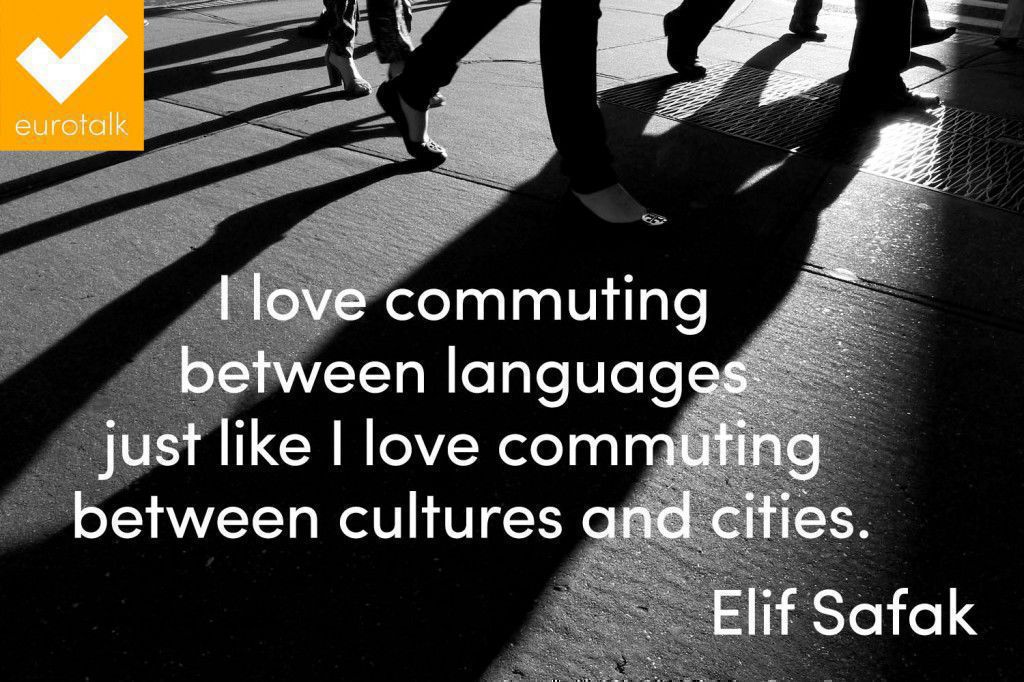The benefits of being multilingual
Today, we’re welcoming back EuroTalk blogger Kirsty with some of the biggest benefits of learning other languages.
How has knowing more than one language helped you? Let us know in the comments!
1. It makes you cleverer
It has long been thought that learning another language, and being competent at it, indicates a high level of intelligence in individuals. Recently this has been proven, with studies on bilingual children showing they were much more developed than their peers, as well as a similar link being drawn between the results of teenagers at school and being able to speak two languages. This means your language learning is actually making you smarter!
2. It can prevent ageing and disease
 People who study an additional language have also been shown to have ‘younger’ brains than would be expected for their age. Cognitive ability, or how effective your brain is at functioning, is much higher in people over sixty that can speak two languages than those who can only speak one. Essentially language learning can prevent the likelihood of forgetfulness and ‘getting slower’ in old age. Learning a second language can also make your brain more resistant to diseases such as dementia and Alzheimer’s. A study conducted on a group of elderly people who spoke both Spanish and English demonstrated that they typically developed symptoms of Alzheimer’s much later than those who only spoke English. Who knew that learning a language might actually be able to prolong your memory and your life?
People who study an additional language have also been shown to have ‘younger’ brains than would be expected for their age. Cognitive ability, or how effective your brain is at functioning, is much higher in people over sixty that can speak two languages than those who can only speak one. Essentially language learning can prevent the likelihood of forgetfulness and ‘getting slower’ in old age. Learning a second language can also make your brain more resistant to diseases such as dementia and Alzheimer’s. A study conducted on a group of elderly people who spoke both Spanish and English demonstrated that they typically developed symptoms of Alzheimer’s much later than those who only spoke English. Who knew that learning a language might actually be able to prolong your memory and your life?
3. It allows you to explore more of the world
Alongside the multiple health benefits of language learning, speaking a second language also allows people to explore the world in a different way. Whilst anyone can visit a country it is the people who can speak the language who truly experience the culture. Basic competency in the language makes the locals more open to helping you and maybe even pointing you in the direction of the best places to visit away from the tourist hot spots. It is these ‘little gems’ that will be the part you remember most from your holiday, from the little hidden coffee shop in Rome to the underground bar in Paris.
4. It opens up new opportunities
There are six million people on earth, so why limit yourself by only speaking one language? New friends don’t just have to come from the same town, or even country, as you live in, but can come from all over the world. The easiest way to gain new friends across the world is to get a pen pal, and in the internet age you don’t even have to pay for stamps! There are lots of good websites that will set you up with a pen pal that speaks the language you’re learning, so why not put your new found language skills to use, make friends and learn even more.
What benefits of learning a second language have you discovered? Let us know!
Kirsty
uTalk Language Challenge – how did we do? [video]
Last month, the EuroTalk team took on a new year challenge – to learn a language using the uTalk app. Some of us did better than others, and Nat was our clear winner, completing the app in just over two weeks.
But the ultimate test was still to come…
Quiz: So you think you know languages?
We’ve got a bit of fun for you today, as it’s the wind-down to Christmas… Amy’s put together this tricky language crossword (you can click on the puzzle to make it bigger and print it out) – how many answers can you fill in before you cave and turn to Google?! 😉
Let us know how you got on in the comments!
(NOTE: There was a mistake in the original crossword. This is the corrected version. We’re very sorry for any confusion!)
Quote of the week: 20 Dec 2014
“I love commuting between languages just like I love commuting between cultures and cities.” Elif Safak
Embed This Image On Your Site (copy code below):
Languages of the week: Scotland
This week we’re celebrating Scotland, in honour of the Braemar Gathering of the Scottish Highland Games, which took place this weekend.
 The Braemar Gathering is one of many events that make up the Highland Games from May to September each year. It’s attended by 16,000 people, including members of the Royal Family. Events include tossing the caber, putting the stone, Highland dancing and piping, and competitors must dress in Highland costumes.
The Braemar Gathering is one of many events that make up the Highland Games from May to September each year. It’s attended by 16,000 people, including members of the Royal Family. Events include tossing the caber, putting the stone, Highland dancing and piping, and competitors must dress in Highland costumes.
Scotland has three languages: Scottish Gaelic, Scots and Scottish English – all of which you can now learn with uTalk.
Scottish Gaelic
The Scottish Gaelic alphabet has 18 letters, each of which is named after a tree or shrub.
It’s spoken by 60,000 people, mainly in the Highlands and the Western Isles, but also in Glasgow, Edinburgh and Inverness.
There are also small Gaelic speaking communities in Canada, particularly in Alba Nuadh and on the Cape Breton Islands.
Scottish Gaelic was seen as a declining language, but recently there’s been a real resurgence in schools and an increased presence in the media. The BBC operates a Gaelic language radio station, Radio nan Gàidheal.
Scots
Scots is spoken in the Lowlands and Northern Isles of Scotland. It has four dialects: Insular Scots, Northern Scots, Central Scots and Southern Scots.
A Germanic language variety, Scots is influenced by Gaelic, Norse, Latin, Dutch, Norman French, Standard French and English.
The poet Robert Burns wrote in Scots; a well-known example is Auld Lang Syne, which was written in 1788 and is now traditionally sung at New Year.
So here’s your Challenge of the Week – we want to hear you singing (or reciting, if singing’s not your thing) Auld Lang Syne in the original Scots. If you’re not sure of the words, the BBC website can help. Send us your videos on Twitter to @EuroTalk with hashtag #1788Scots
Scottish English
Also known as SSE (Standard Scottish English), Scottish English dates back to the 17th century, when Scots and English combined.
Although an English speaker can understand Scottish English, the language contains a lot of different words. Some examples are: ‘poke’, which in Scottish English is a container for chips, ‘ken’, which means ‘know’, and ‘aye’, which is the Scottish way of saying ‘yes’.
A few fun facts about Scotland
The national animal of Scotland is the unicorn.
The shortest scheduled flight in the world is from Westray to Papa Westray in the Orkney Islands of Scotland. At just one and a half miles long, it only takes 1 minute 14 seconds.
Scotland’s traditional dish, haggis, consists of the heart, liver and lungs of a sheep boiled in its stomach. It’s tastier than it sounds!
The first recorded sighting of the Loch Ness Monster was in 565 AD, when a ‘water beast attacked one of St Columba’s followers in the loch’.
What’s your favourite Scotland fact?


